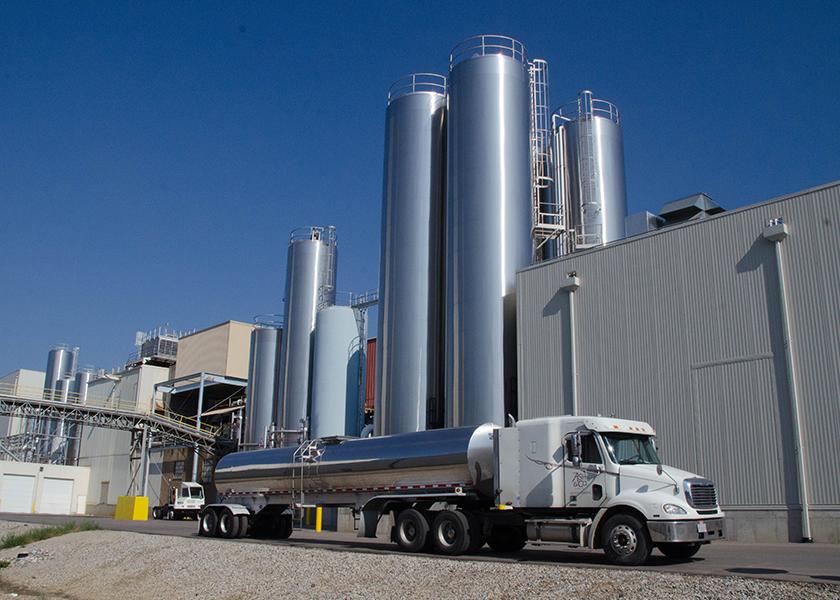A Good Processor-Producer Relationship is Essential

While farmers and processors have had a longtime business relationship, the days of a processor stopping at your farm for a cold call to see if you are interested in switching milk companies are long gone. Although, Jordan Matthews, a partner at Rosy-Lane Holsteins in Wisconsin, shared they had to get to know a new processor a couple of years ago.
Rosy-Lane milks 1,550 cows across two locations—the home farm in Watertown, and a purchased second farm in Paoli in 2021. A year later, Lloyd and Daphne Holterman began their retirement process, and both Matthews and Tim Strobel continue to purchase the business from them, as well as run the day-to-day operations.
Matthews shares that they work with two processors, who work very differently. At the home farm, Rosy-Lane has had a long-establishing relationship with that processor for nearly 10 years now.
“They’ve been awesome,” he says. “Since the beginning of COVID, they have been pretty transparent about the hardships they're dealing with and how they worked with us.”
While one of their processors has been very open about the vision and future of their business, Matthews notes the other processor has a different philosophy.
“One is very open with us about the vision and future of their business. Through that, they are able to share the why behind their goals. With that, it becomes more understandable when they come to our farm with ideas and recommendations for change. They seem completely transparent which is easy to build trust,” he says. “Our other processor is very hands-off. They want our milk and the conversation is pretty short and left at that. We have enjoyed working with both, however, we have had to learn how to communicate (like anything) with both as they operate very differently."
Matthews said that his team at Rosy-Lane focused on controlling the controllables.
“The processor puts out goals on the product (milk) they want and the things they want to see out of our dairy,” he says. “So as long as we control that, we've been able to keep them happy and in return, they're keeping us happy on our milk price.”
Contracting Principles
Lucas Sjostrom serves as the executive director of the Minnesota Milk Producers Association and is the managing director of Edge Dairy Famer Cooperative. He strongly encourages producers to talk to their milk buyer, reviewing the details of your contract.
“What are the contracting principles, as we call it,” he asks.
Sjostrom shared that recently a Minnesota plant had assumed that they’d be paid a federal order minimum price. But when the plant called the producers the night before and told them they couldn’t take their milk anymore, all of a sudden nothing was guaranteed any longer.
“Let's make sure that farmers aren't getting tricked by processors accidentally,” Sjostrom said, sharing it’s a two-way street and farmers and processors don’t want big surprises and that communication is key.
Solid Communication All-Around
Ed Gallegher, president of Dairy Farmers of America (DFA) Risk Management program, echoes Sjostrom's comments and says it is important to have an advisory team that producers can interact with regularly.
“I hope you also have a strong relationship with somebody that can talk to you a little bit about the milk price risk and the food price risks that are in the marketplace,” he says. “It's an important aspect to focus on. Certainly, it’s also important to work with your lender, veterinarian, as your genetics companies – particularly in a way that can improve your component production that will pay dividends year in and year out.”
Tyler Reynolds, who is an owner at Reyncrest Farms in New York, says they too are fortunate with a good relationship with their processor, Upstate Niagara. Reynolds milks 1,400 cows and farms 2,700 acres alongside his family near Buffalo.
Reynolds concurs with Matthews and says it’s the processor’s job to market the milk. His processor sends out a survey at the beginning of the year to get an idea of what farms are thinking in terms of growth.
“I think the biggest thing that we see is the more honest we are with them, the better everybody's going to be in the end,” Reynolds shares. “They need to plan too.”
At the end of the day, solid communication between the processor and the farm is essential and firmly understanding the processor’s strategic long-term vision is vital.







